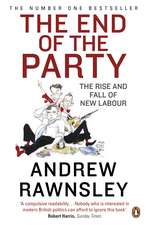Party Brands in Crisis: Partisanship, Brand Dilution, and the Breakdown of Political Parties in Latin America
Autor Noam Lupuen Limba Engleză Paperback – 12 iul 2017
| Toate formatele și edițiile | Preț | Express |
|---|---|---|
| Paperback (1) | 285.16 lei 43-57 zile | |
| Cambridge University Press – 12 iul 2017 | 285.16 lei 43-57 zile | |
| Hardback (1) | 699.12 lei 43-57 zile | |
| Cambridge University Press – 14 ian 2016 | 699.12 lei 43-57 zile |
Preț: 285.16 lei
Nou
Puncte Express: 428
Preț estimativ în valută:
54.58€ • 59.31$ • 45.88£
54.58€ • 59.31$ • 45.88£
Carte tipărită la comandă
Livrare economică 21 aprilie-05 mai
Preluare comenzi: 021 569.72.76
Specificații
ISBN-13: 9781107423206
ISBN-10: 1107423201
Pagini: 263
Ilustrații: 23 b/w illus.
Dimensiuni: 150 x 230 x 18 mm
Greutate: 0.39 kg
Editura: Cambridge University Press
Colecția Cambridge University Press
Locul publicării:New York, United States
ISBN-10: 1107423201
Pagini: 263
Ilustrații: 23 b/w illus.
Dimensiuni: 150 x 230 x 18 mm
Greutate: 0.39 kg
Editura: Cambridge University Press
Colecția Cambridge University Press
Locul publicării:New York, United States
Cuprins
1. Why do parties break down?; 2. Brand dilution and party breakdown; 3. Explaining party breakdown across Latin America; 4. Argentina - Peronism survives, radicals collapse; 5. Venezuela - AD and COPEI break down; 6. Party brands and mass partisanship - experimental evidence; 7. Party brands and mass partisanship in comparative perspective; 8. Parties, partisanship, and democracy: conclusions.
Recenzii
'Why do established parties sometimes dramatically collapse, often within a single electoral cycle? Lupu's persuasive answer is that such collapse occurs when parties switch positions, make unholy alliances with former adversaries, and converge on the policy positions of their opponents in order to attract floating voters and win the next election. When leaders thus 'dilute the party brand', parties hemorrhage partisans and are in turn left defenseless against the wrath of the electorate in hard times. Party Brands in Crisis challenges the way we think about partisanship and deserves to be read by students of political parties everywhere.' Frances Hagopian, Harvard University, Massachusetts
'Why do long-lasting parties collapse? In answering this question Lupu demonstrates how, as the result of strategic decisions made by the party elite, party brands can become diluted and voter attachments to parties can become attenuated. This is a book every scholar of parties will want to read. It promises to help reshape the way we think and talk about party labels and partisan loyalty.' Allen Hicken, University of Michigan
'Party Brands in Crisis may be the most important book on Latin American parties published in a generation. It offers a compelling theory - and an impressive array of evidence - to explain why many established parties have weakened or collapsed in Latin America over the last quarter century. In so doing, it highlights a crucial consequence of the region's programmatic convergence during the 1990s: parties that embraced the Washington Consensus diluted their brands and, consequently, ceased to stand for anything in the eyes of their supporters. Party Brands in Crisis is destined to become a classic work in the literature on political parties. It will be a must-read not only for scholars of Latin American politics but for anyone interested in political parties.' Steven Levitsky, Harvard University, Massachusetts
'Lupu provides here a very significant contribution to the literature on political parties, and especially to our understanding of Latin American politics. He develops a novel and insightful theory about party brands and their erosion based on ideological convergence and negative performance. He tests the implications of his theory making an impressive use of multiple methodologies to explain party breakdown in Latin America. Moreover, the implications of his study go beyond the region as suggested by his exploration of the relationship between polarization and party brands. In sum, this book is most likely to generate a new research agenda for the study of political parties, which will have a long-lasting effect on the discipline.' M. Victoria Murillo, Columbia University, New York
'Why do long-lasting parties collapse? In answering this question Lupu demonstrates how, as the result of strategic decisions made by the party elite, party brands can become diluted and voter attachments to parties can become attenuated. This is a book every scholar of parties will want to read. It promises to help reshape the way we think and talk about party labels and partisan loyalty.' Allen Hicken, University of Michigan
'Party Brands in Crisis may be the most important book on Latin American parties published in a generation. It offers a compelling theory - and an impressive array of evidence - to explain why many established parties have weakened or collapsed in Latin America over the last quarter century. In so doing, it highlights a crucial consequence of the region's programmatic convergence during the 1990s: parties that embraced the Washington Consensus diluted their brands and, consequently, ceased to stand for anything in the eyes of their supporters. Party Brands in Crisis is destined to become a classic work in the literature on political parties. It will be a must-read not only for scholars of Latin American politics but for anyone interested in political parties.' Steven Levitsky, Harvard University, Massachusetts
'Lupu provides here a very significant contribution to the literature on political parties, and especially to our understanding of Latin American politics. He develops a novel and insightful theory about party brands and their erosion based on ideological convergence and negative performance. He tests the implications of his theory making an impressive use of multiple methodologies to explain party breakdown in Latin America. Moreover, the implications of his study go beyond the region as suggested by his exploration of the relationship between polarization and party brands. In sum, this book is most likely to generate a new research agenda for the study of political parties, which will have a long-lasting effect on the discipline.' M. Victoria Murillo, Columbia University, New York
Notă biografică
Descriere
Party Brands in Crisis offers a new way of thinking about how the behavior of political parties affects voters' attachments.

















